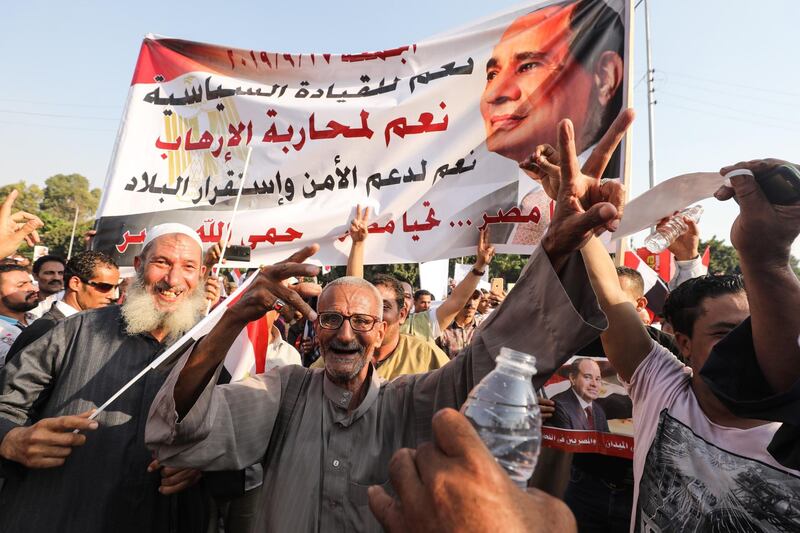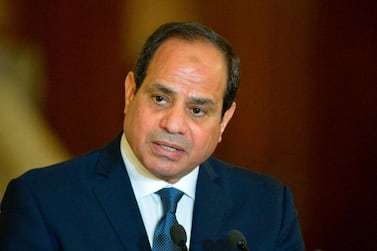A series of brief but rare street protests in Egypt appear to have jolted authorities into an intensely publicised discussion on adjusting economic policies and tolerating a role for the opposition.
Played out in parliament and in the media, the discussion is far from being critical of policies embraced by President Abdel Fattah El Sisi. On the contrary, the debate appears to have been sanctioned by the government with the intention of placating Egyptians squeezed by economic policies and is focusing its blame on certain policies, not the president.
It is impossible to accurately predict whether the conversation would eventually be the foundation of a major shift away from existing policies, but the fact that a public debate questioning government policies is taking place is a milestone — it is something that was unthinkable just weeks ago and it could reshape the rule of Mr El Sisi, a general-turned-president who has been in office since 2014.
“Nothing on the ground has really changed now, but it cannot be ruled out that, long term, the government might revise its policies and allow a window for people to vent off,” said Shady Lewis Botros, a London-based political analyst and author.
Mr El Sisi is the architect of reforms introduced in 2016 that won lavish praise from international financial institutions. The reforms, which may have prevented a complete economic meltdown, hurt the economically vulnerable because of the steep rise in prices, taxes and services they unleashed. The 64-year-old is also the leader of a high-octane, single-handed campaign to upgrade the country’s rickety infrastructure, the creation of 14 new cities, unprecedented health campaigns and the multibillion US dollar purchases of cutting-edge weapons.
His drive to modernise the country and the armed forces comes at a time when Egyptian security forces are battling Islamic militants in a years-long fight raging in the north of the Sinai Peninsula.
The protests of September 20 and 27 — they were small and quickly dispersed — came in response to a call for anti-government demonstrations by a businessman living in self-imposed exile in Spain. Contractor and actor Mohammed Ali, in a series of videos posted online that were widely shared, also made corruption allegations against the government.
Mr El Sisi rejected the allegations as “lies” and said the protests on September 20 were the work of “political Islam,” a term widely used to refer to the Brotherhood, also branded a terrorist organisation.
However, Egypt’s chief prosecutor, Hamadah El Sawy, said in a statement on September 26 that questioning the 1,000 people detained in connection with the September 20 protests revealed that some of them took to the streets because of their “bad economic conditions.” The rest, he said, were members of the Brotherhood, individuals bribed to protest or opposed to the government.
In the same vein, the editor of the independent Al Shorouk newspaper said in a recent column that it would be a mistake to blame last month's protests on the Brotherhood alone. Instead, he suggested that the protests be "scientifically" investigated. The findings of that probe, wrote Imad Hussein, should be used to empower the government to "restore, repair and remedy" policies.
On his part, Mr El Sisi, who has made the economy and security his rule’s top priorities, implicitly acknowledged that economic hardships may have had something to do with the protests.
Tweeting last weekend, he said he appreciated the “position” of limited-income Egyptians who have been kicked out of a food subsidy programme that allows 60 million people to receive heavily discounted foodstuffs.
“I want to tell them to rest assured because I am personally following these measures and I reassure you that the government is totally committed to protecting the rights of poor citizens,” said the Egyptian leader. The response to Mr El Sisi’s tweet was swift, and decisive.
The government on Tuesday said it was reinstating 1.8 million Egyptians in the food subsidy programme who had successfully appealed against their exclusion following income reviews that disqualified them.
“We need a genuine and national reconciliation with the middle class, which has been eroded and relegated to join the downtrodden classes,” Mustafa Bakry, a lawmaker known for his staunch support of Mr El Sisi, told parliament on Tuesday, alluding to the adverse impact of the economic reforms on the middle classes.
“Mr President, listen to the people’s problems … look inside the closet and you’ll find many things that need to be changed,” he told the chamber.
The ongoing conversation is also going beyond the welfare of the poor and into political freedoms.
Parliament speaker Ali Abdel Al, another uncompromising supporter of El Sisi who has harshly dealt with dissent in the chamber, made a startling statement on Tuesday.
Addressing lawmakers, he said: “The coming phase will witness political, partisan and media reforms.” He did not elaborate, but he followed his statement with renewed vows to remain firmly behind Mr El Sisi and blaming Egypt’s woes on government officials.
“The problem is that we have a president who makes giant steps towards the realisation of goals but we have a government that is handicapped,” he said.







